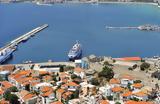ESPO asks to recognise the cross-border dimension of EU ports and to strengthen the maritime connectivity in CEF II
The investment needs of European ports over the next ten years amount to 48 billion EUR. Many port investments score high in creating societal value but the return on investment for the investor, the port managing body, is often low and slow.
For these investments, external funding is needed. Ports have only been able to obtain 4% of the CEF transport budget over the
ESPO welcomes the CEF II proposal and appreciates the efforts that have been made to further optimise and ensure the continuation of this important financial instrument for transport.
“ESPO is fully recognising the importance and benefits of the Connecting Europe Facility; we should use the experience of the past three years to further optimise this instrument; we count on the European Parliament and the Council to safeguard the budget proposed, which is a real minimum.
Given their important role as nodes of transport, energy, industry and blue economy ports deserve more than the 4% share they obtained over the last three years. Concretely we believe that ports and the maritime dimension should be better recognised under the cross-border priority.
Seaports have the potential to link any number of Member States through maritime transport, as well as to link the sea with a wide hinterland and economic area that in most circumstances exceeds the national borders.
They are by nature cross-border and should be recognised in that respect”, says ESPO’s Secretary General Isabelle Ryckbost.
Based on the outcome of the ESPO study, ESPO formulated concrete recommendations and suggestions in its position paper to further optimise the Commission proposal.
ESPO asks the Parliament and Council to:
ensure that an increased share of the CEF budget is accessible to ports, reflecting their essential role in the European Transport network;recognise the cross-border nature of ports and the maritime cross-border dimension which has the potential to link a port not only with their neighbours but with all other maritime Member States;re-integrate the currently pre-identified port and MoS projects in the Annex of pre-identified sections of the new proposal;put more emphasis on the decarbonisation investments to be made;better define the military mobility budget share, which will receive 1 on 5 EUR of the CEF transport budget and to prioritise the transport policy priorities in defining the dual-use;use the military mobility budget to enhance the resilience of Europe’s infrastructure and, in particular its port infrastructure, to cyber security threats and ensure that ports can play their vital role as part of the emergency supply chain;exempt projects with a limited impact on the national transport network from Member State endorsement;highlight the importance of the maritime connections of the EU with its neighbouring countries;ensure optimal connectivity of Ireland to mainland Europe in the context of Brexit;foresee a review mechanism following the review of the TEN-T guidelines in 2023 and the outcome of the Brexit negotiations.The proposal is currently under discussion in the Parliament and the Council.
Last week, the EP-TRAN rapporteurs, Pavel Telička (ALDE, CZ) and Marian-Jean Marinescu (EPP, RO), presented their draft report in the TRAN Committee. The deadline for amendments is 13 September.
The post ESPO asks to recognise the cross-border dimension of EU ports and to strengthen the maritime connectivity in CEF II appeared first on Metaforespress.
- Δημοφιλέστερες Ειδήσεις Κατηγορίας Οικονομία
- Άννα Κορακάκη: Η απίστευτη αντίδρασή της όταν κατάλαβε ότι κέρδισε το χρυσό! (pic+video)
- Τι αλλάζει στη λειτουργία των εισπρακτικών εταιριών
- EDS: Ποια είναι η σκοπιανή εταιρεία για την οποία η ΔΕΗ έδωσε €4,8 εκατ.
- Σε στάδιο μετάβασης η συνδρομητική τηλεόραση
- Αντίστροφη μέτρηση για το Mega - Οριστικό «μαύρο» σε 2 εβδομάδες
- Σύλληψη 32χρονου αλλοδαπού για τέσσερις εμπρησμούς στην Αθήνα
- Γιατί βουλιάζουν τα κρυπτονομίσματα και μπορεί αυτό να αλλάξει;
- Μεγάλος σεισμός 6,7 ρίχτερ στην Ιαπωνία - Οκτώ οι νεκροί ως τώρα
- Στη Θεσσαλονίκη ο Κυριάκος Μητσοτάκης
- Τουλάχιστον 8 νεκροί από το σεισμό των 6,7 Ρίχτερ στην Ιαπωνία
- Δημοφιλέστερες Ειδήσεις metaforespress

- Τελευταία Νέα metaforespress
- ESPO asks to recognise the cross-border dimension of EU ports and to strengthen the maritime connectivity in CEF II
- H ανακοίνωση της Emirates αναφορικά με το περιστατικό που συνέβη στην πτήση ΕΚ203 από το Ντουμπάι στη Νέα Υόρκη
- Την άμεση ανάκληση της απόφασης για κατάργηση της γ’ βάρδιας του τελωνείου ζητά ο ΟΛΘ
- Κανένα έργο δεν έχει προχωρήσει στην Κρήτη, καταγγέλλει ο Λ. Αυγενάκης
- Αυξήθηκαν 12% τα έσοδα του ομίλου ΟΑΣΑ τον Ιούλιο, μειώθηκε στο 14% η εισιτηριοδιαφυγή σε λεωφορεία και τρόλεϊ
- Η ΕΛΙΜΕ «αποχαιρετά» τον Σταύρο Δρακονταειδή
- Siemens Mobility presents new Vectron Dual Mode locomotive
- Την υπηρεσία «off airport check-in» θα παρέχει στους επισκέπτες της 83ης ΔΕΘ η Fraport Greece
- Αρχές του επόμενου τριμήνου αναμένονται οι δεσμευτικές προσφορές για την μαρίνα Χίου
- Η Royal Mail εξαγόρασε, αντί 360 εκατ. δολ., την καναδική Dicom Canada
- Τελευταία Νέα Κατηγορίας Οικονομία
- Αρχίζει η παραλαβή ελιών από την Ένωση Αγρινίου
- Πρόστιμο 150 ευρώ για όσους δεν περάσουν από ΚΤΕΟ
- Intimissimi: Το φαντασμαγορικό fashion show στη Βερόνα (pics+video)
- Δ.Βίτσας: "Πολύ δύσκολη έως οριακή" η κατάσταση στο hotspot της Μόριας
- Απώλειες στις ευρωαγορές, απογοήτευσαν τα γερμανικά μάκρο
- Στο «κόκκινο» οι ασιατικές αγορές
- Η Trastor πήρε από πλειστηριασμό ακίνητο 781 τμ στην Λ. Μεσογείων 109 αντί 965.000 ευρώ
- Πέλλα: 30χρονος παρασύρθηκε από εμπορική αμαξοστοιχία



